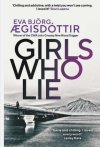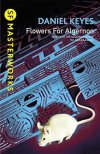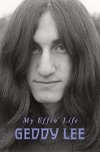- Cunning Folk – Adam L.G. Nevill - 8/10
- Bad Apples – Will Dean – 7/10
- The Winter Road – Adrian Selby – 6/10
- The Dark Place – Damian Vargas – 9/10
- Act of Oblivion – Robert Harris – 7/10
- The Tyranny of Faith – Richard Swan – 7/10
- The Game – Micah Richards – 8/10
- The Ticket Collector from Belarus – Mike Anderson and Neil Hanson – 8/10
- The Satsuma Complex – Bob Mortimer – 6/10
- Notes on an Execution – Danya Kukafka – 9/10
- And Away … – Bob Mortimer – 7/10
- Dead Man's Blues - Ray Celestin – 8/10
- On Wings of Eagles – Ken Follett – 8/10
- Priest of Gallows – Peter McLean – 8/10
- Quantum Radio – A.G.Riddle – 3/10
- The Maleficent Seven – Cameron Johnston – 6/10
- The Second Sleep – Robert Harris – 8/10
- Flowers for Algernon – Daniel Keyes – 7/10
- My Effin’ Life – Geddy Lee – 9/10
View attachment 101287
If you don’t know him, Geddy Lee is the singer/bass player with Canadian rock band, Rush. Ever since this autobiography was announced I’d been looking forward to getting stuck into this and it didn’t disappoint.
Just to set the context – I am a Rush fan, but not a devotee. I bought a couple of their albums in the 80s/90s, but it wasn’t until the release of
Snakes & Arrows in 2007 that I really started to listen to their deep back catalogue. Sadly, I never got to see them live.
The first thing to say is that this is not a warts-and-all behind the scenes expose, and that’s because Mr Lee has a far more interesting tale to tell. A shadow hangs over both the start and end of this book. After the usual stories of when the subject of the book was born and their experiences in their formative years, he devotes a long chapter to the story of his parents. They were originally from Poland and suffered four years in various concentration camps including Auschwitz and Bergen-Belsen. Lee has dutifully pieced together their story based on what his mother told him, what his surviving relatives had to say and cross referenced it with the work of Holocaust experts. As you’d expect, it’s a harrowing tale but a fitting testament to his parents and how it has shaped his life.
As Rush fans will undoubtedly know, the shadow at the end of the book is the family tragedies suffered by drummer/lyricist, Neal Peart, and his eventual death from a brain tumour in 2020. Geddy Lee manages to convey the emotions that he and guitarist, Alex Lifeson, went through in the last three years of Peart’s life, including their regular visits to his home in Los Angeles.
In between, he manages to relate the story of Rush and interleaves it with his feeling about his work and personal life at each stage of his career. He’s not afraid to pick at the issues that his choice in career have had on himself and his family, noting that “
it’s an unpleasant fact that few musicians, myself included, are prepared to give up their gig to raise a family”. Later on, he notes that being in a band “
demands precedence over everything, silently running (and occasionally ruining) your life.”
He also tackles the potentially prickly subject of how critics react to his voice, taking it mostly in good humour.
Occasionally, there’s a little nugget about what it takes to put on and run a show that isn’t immediately obvious to the audience. For example, Lee states that sometimes the crew will tell you in your earphone that there’s trouble in the audience and ask you to stall before the next song. Throughout the book, he’s also incredibly thankful for the amazing job done by the Rush road crew over the years. The fact that some of them were there from the start and were still there at the end speaks volumes of the close-knit bond forged between the band and their touring team.
In addition to the tragic nature of the closing chapters, Lee also tackles the dreaded “R” word and how he felt about it. “R” in this case is retirement. With Neal Peart wanting more time at home and Alex Lifeson suffering medical issues, he is honest enough to admit that events left him frustrated because he didn’t want the show to stop. But with the benefit of hindsight, he has the good grace to admit that Neal Peart was right. He explains that in addition to medical issues and homesickness, Peart had identified, even as early as the demo sessions, that Rush’s final album,
Clockwork Angels, was their strongest work. As a relatively latter-day fan, whilst I love their classic material from the mid-70s to early 80s, I have to agree that
Clockwork Angels is an immense album and perhaps a fitting way to end a glorious recording career.
The book closes with Geddy Lee’s life now as a contented husband, father and grandfather, and it’s good to see that he now makes his decisions on what fits in for both he and his wife, Nancy. I was also interested to read that they regularly visit the UK for walks in places such as the Lake District. You never know, one of us may bump into them at some point.
On one of the music threads,
@threespires asked if this book might be suitable for the general music fan who is not necessarily into Rush. My initial thought was “no” because Rush is such a cult band. But after I finished the book and began to put this review together, I’ve changed my mind. Whilst Rush recorded a lot of albums, and most are covered, Geddy Lee doesn’t spend pages and pages dissecting each one. In fact, for a couple of albums, it was “next we recorded album X and when the tour finished ….” Whilst this may frustrate hardcore fans, I think it helps the flow of the book with not getting bogged down on why they recorded a certain track in a certain way.
What you have is a very well put together and considered piece of writing by a top-class musician who has seen it all from the 1970s to the present day. The book doesn’t lack drama or emotion, and I suspect a lot of what it has to say will resonate with music fans in general.







